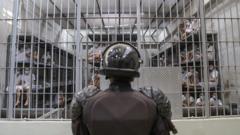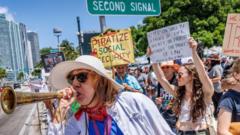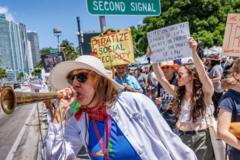The US Supreme Court has ordered a pause on the Trump administration's deportation of detained Venezuelan nationals linked to gang activity, citing procedural rights. The decision follows concerns over their ability to contest their deportations and the legality of actions taken under the Alien Enemies Act.
Supreme Court Intervenes in Controversial Deportation of Venezuelans

Supreme Court Intervenes in Controversial Deportation of Venezuelans
Justices halt actions under the 18th-Century Alien Enemies Act following legal challenge from civil liberties group.
The US Supreme Court has issued a significant ruling pausing the Trump administration's deportation efforts regarding alleged Venezuelan gang members being held in detention centers in Texas. The case emerged after a civil liberties organization raised concerns about the detainees' rights, claiming they had not been afforded proper legal recourse to contest their deportations.
This decision marks a critical moment as the Trump administration has relied on a rarely invoked 18th-Century law—the Alien Enemies Act of 1798—to justify the detention and removal of said individuals, many of whom are believed to have been involved with the Venezuelan gang known as Tren de Aragua. The law permits the president to detain and deport individuals from nations classified as enemies during times of conflict without the usual legal processes. Historically, this act has only been utilized a handful of times, most notably during World War II when thousands of Japanese Americans were interned.
Despite earlier rulings permitting the use of this law, the Supreme Court has now mandated that those targeted for deportation must be given a chance to contest their removal. The legal suit highlighted alarming procedural lapses, such as notices of deportation issued in English to individuals not proficient in the language, thus limiting their ability to understand and challenge their legal situation. The ruling emphasizes the need for judicial oversight in immigration cases, especially those involving life-altering decisions such as deportation to potentially dangerous environments.
Out of 261 Venezuelans who have faced deportation to El Salvador, 137 were specifically removed under this controversial act. The administration’s efforts have faced multiple legal challenges, underscoring the contentious nature of Trump's immigration policies.
Moreover, the court's ruling has wider implications as it obligates the government to allow a legal remedy, particularly for individuals like Kilmar Ábrego García, who was mistakenly deported but is fighting against being labeled a gang member. The Kavanaugh-rejected ruling aims to reposition procedural justice at the forefront of immigration enforcement, while Trump’s administration continues to stress the urgency of eradicating foreign gangs in the US.
As legal battles persist, the decision has drawn mixed reactions, revealing deep divides over immigration policy and the balancing act between national security and individual rights.




















